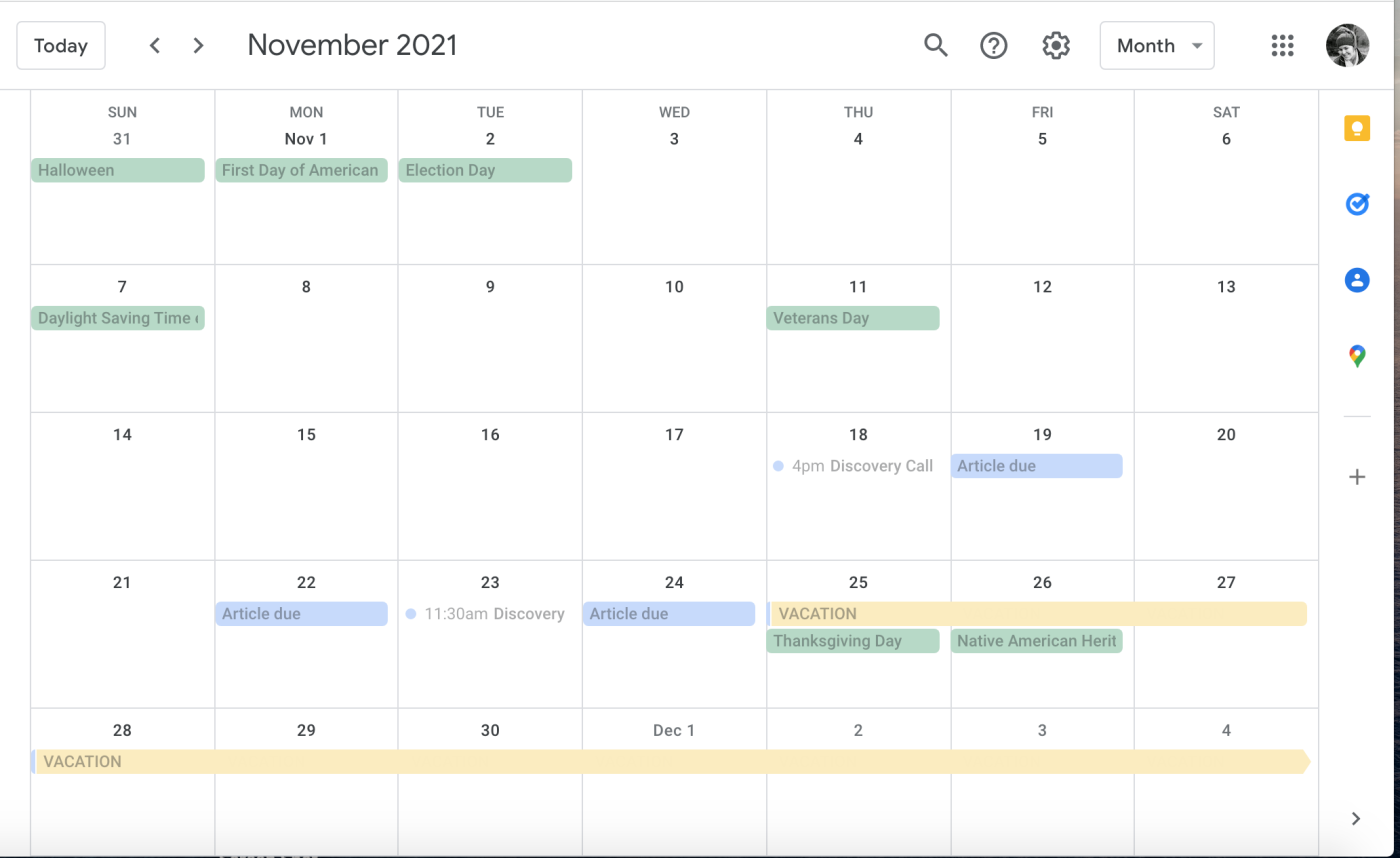I've been lucky enough to take regular vacations throughout my five-year freelance career. From family trips to long weekends, time off to travel and visit the people I love has always been a priority. Of course, actually unplugging from my work while I'm on vacation is another story.
Case in point: I'm currently writing this while on a plane flying to visit my in-laws (vaccinated and masked, of course).
We can get into whether a working vacation meets the definition of vacation at all another time. But it's hard to fully unplug and unwind as a freelance business owner. There always seem to be emails to answer, clients to manage, and marketing to do—not to mention deadlines to meet—all driven by that nagging fear that if I slow down, I'll lose work or clients (or both).
And what if I never get another assignment again? What if I lose my momentum? What if my clients hate me for leaving them for a week or two?
What if what if what if.
It might sound dramatic, but it's easy to spiral and let fear drive the decision-making process when running a business. After all, this is my livelihood, and I don't have the luxury of built-in PTO or a salaried job that I can trust will be ready for me when I return. I'm a one-woman show. Time off often means money left on the table and day-to-day business admin piling up. And that makes it difficult to find (and actually take) time off.
But taking breaks isn't just a luxury or a nice-to-have. Not as an employee and definitely not as a freelancer. This year, I learned that the hard way.
Approaching burnout
This year, I've focused on growing my business from a part-time pursuit to a full-time career. While it's been a rewarding year, I quickly found myself working nonstop, sometimes over 50 hours a week. And when I took two family vacations over the summer, I ended up dedicating entire days to work instead of relaxing and being with the people I love.
As much as I loved the direction my business was going, my health and well-being were strained. I had trouble sleeping—made all the more difficult by my sporadic schedule, often writing late into the night to stay ahead of deadlines. I was stressed all the time, I had little time to exercise, and I wasn't eating well, resorting to take-out and freezer dinners far too often because I didn't have the time or energy to make a home-cooked meal.
I knew something had to give. And I quickly realized: I needed to take a real vacation.
But knowing what to do and actually doing it are two different things. While I knew I needed a break, taking one would require changing my approach.
8 tips for taking time off as a freelancer
When your livelihood depends on you working and maintaining a business, it can feel dangerous to step away.
And this is true whether you have a busy client workload or are hustling to fill your calendar. On the one hand, if you have a growing business, stepping away might mean dropping the ball. On the other hand, if you don't have enough work (or as much as you'd like), taking time off might feel like something you literally can't afford to do.
But the truth is, you can't afford not to take a break. Taking time off as a freelancer is possible. It just requires strategic planning. Here's what's worked for me:
1. Plan ahead to build it into your calendar
One of the most important steps to building vacation into your schedule is to prioritize it ahead of time. Block out time that you'll dedicate to a vacation (even if it's a staycation), and put it on the calendar so you can plan around it when scheduling client work. Putting it on the calendar ensures you've accounted for that time: you won't overbook yourself and you can notify your clients in advance, so they're prepared too.
This is a good exercise for your annual business planning at the beginning of the year, especially if you know that you have a family trip or holiday coming up, but you can do it anytime.

2. Tell your clients early
For longer time off that will impact regular client schedules, notify your clients at least a few weeks ahead of time, so you can work with them to plan around your vacation.
Telling your client you're taking time off (rather than asking) can feel uncomfortable at first. Having a simple script can help. Here's what I wrote to one client:
Hi, Client!
I wanted to give you a heads up that I will be taking some time off next month and will be unavailable from [date to date]. Just wanted to get that on your radar as you plan out your calendar for the next few weeks. In the meantime, please keep sending work my way—I have capacity for 1-2 projects a week before I take off.
For this trip, I'm taking two weeks off and notified my clients about a month before. Most clients are flexible and happy to work with you around your calendar—especially when you have plenty of notice. For instance, one of my monthly clients had a deadline right when I return, and I asked to bump the assignment a few days:
Hi, Client,
I will be OoO for two weeks from [Date to Date]. With our current cadence, I can get the last article in before I leave, but would it work for your team if we moved the first deadline next month from [X Date to Y Date]?
Or let me know if there's a better timeline for you. Thanks!
Their response?
Hi Brittney,
That works great for us, so we'll plan on that. Thank you for the heads up!
Easy peasy. For the rest of my clients, I made sure to tie up the month's projects before I left and said no to any assignments that landed during my time away. Which brings me to my next tip.
3. Budget for your vacation
Freelancers don't get PTO from an employer—time off work is time not making money. But that doesn't mean you shouldn't take a vacation. It just means you need to budget for it and set rates and balance your workload accordingly.
For me, that included raising my rates this year and taking on more assignments in the months leading up to my vacation. That way, by the time my trip rolled around, I could afford a lighter month of work and not feel (too) guilty for turning down projects.
Pro tip: Set up a business account for your freelance income, then schedule automatic payments every two weeks to your personal account, so you have a regular "paycheck" coming in. (You'll need to build up some savings here for a cushion). That way, you have your own "PTO" with a steady income. This can help you budget not only for vacations but also for your normal monthly expenses, without feeling as much pressure during freelance ebbs and flows.
4. Get ahead on your work
You don't want to burn yourself out (more), but if you have the bandwidth, front-loading your work can help you fit in all your projects early, so you can take time off without disrupting your income.
This is easiest to do when following the first two steps of planning ahead and communicating with clients early. Letting my clients know ahead of time what my calendar and availability will be gives them the chance to plan which projects to send my way (and get them to me in time).
While this does mean you might be doubling up on work for a week or two, it also keeps your income relatively steady—which is especially important for freelancers with less flexibility in their budgets.
5. Set boundaries for yourself
Boundaries are a freelancer's best friend. While saying no isn't always easy (especially for us people-pleasers out there), setting expectations up front is key to freelance survival.
That's why I plan to fully unplug on this vacation. No checking my email, no following up on work, nothing. For a recovering perfectionist and anxious business owner, the prospect feels both liberating and scary—I hate the idea of not being in control. And how can I feel in control if I'm not checking email?!
But I also know it's something I need and deserve.
To make this work without leaving clients or prospects hanging, I set an automated out-of-office notification on my email.
![Brittney's out-of-office message: I will be OoO until [Date] enjoying a long-awaited vacation. I promised my husband I would fully check out of work (first time in years) so I will not be checking emails while I'm away but you can expect a response from...](https://images.ctfassets.net/lzny33ho1g45/3iYoUIoStQWIswXYJOhsd5/281e5f9089640b94f1315122859a40a1/b57a291b48127b8e00e75e18dc0430f9.png?w=1400)
Are you seeing a theme here? It's all about communication. Learn to say no to work opportunities scheduled on your vacation, and communicate with clients to set deadlines that work for you.
6. Consider subcontracting work
Full disclaimer: I haven't had to do this yet, but especially for busy seasons where I don't want to say no to work, hiring a subcontractor to keep things rolling while I'm out is a good option.
Subcontracting takes a little more planning—especially if you aren't currently working with anyone yet. If you know you want to subcontract work during your vacation, start the hiring process early, as it will take time to vet and onboard the right people for your business.
As I continue to build up my business, I expect to work at least occasionally with subcontractors throughout the year. Building those relationships now before I'm swamped or on the eve of a vacation will set me up to more easily hand off assignments and be more flexible with my time.
7. Work on your mindset
Taking a vacation is hard for freelancers because we're used to a feast-or-famine cycle, and saying no to work is scary. But shifting your mindset can make a world of difference.
I find it helpful to remind myself of these things:
My clients will be there when I return.
I've found work before, so I can find more work when I get back.
Vacation isn't a nice-to-have: it will make me better at my work.
They're simple mantras, but they help ground me in reality and stop the worry cycle from spiraling into a full-blown panic. If you're a worrier like me, or just find the prospect of leaving your business on auto-pilot for a few days or weeks to be daunting, work on changing the narrative in your thought patterns. This will not only reduce stress but also help you make vacations and time off the priority they should be.
8. Start small
Every situation is different, and not everyone can afford an extended vacation. If you can't take a full week off (or more), start small with a few days or a long weekend to recharge. You don't even have to go anywhere either. Staycations can be as relaxing and rejuvenating as a trip to the beach (ok, maybe not as relaxing as the beach—but you get the picture).
Simply taking a step back to unwind will give your mind and body the time they need to recharge. Even just a day or two can help you return to work with fresh perspective, renewed energy, and motivation until your next vacation.
A rested freelancer is a better freelancer
Taking a vacation as a freelancer isn't always easy—but it's worth it. So start where you are. Whether that's a long weekend away, a one-day staycation, or a week (or two or three) in the sun, start planning now for your next break.
Now if you'll excuse me, I have a vacation to take.





